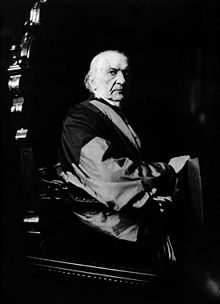- Protection of Person and Property Act 1881
-
 The 1881 Act was introduced by William Ewart Gladstone.
The 1881 Act was introduced by William Ewart Gladstone.
The Protection of Person and Property Act 1881 was one of more than 100 Coercion Acts passed by the Parliament of United Kingdom of Great Britain and Ireland between 1801 and 1922, in an attempt to establish law and order in Ireland.[1] The 1881 Act was passed by parliament [2] and introduced by Gladstone. It allowed for persons to be imprisoned without trial.[3] On 13 October 1881, the Act was used to arrest Charles Parnell [4] after his newspaper, the United Ireland, had attacked the Land Act:[5]
- An Act for the better Protection of Person and Property in Ireland
- Copy warrant to arrest
Whereas by an order of the Lord-Lieutenant... by virtue of the Act... and of every power and authority in this behalf... the county of the city of Dublin should become a prescribed district and Charles Stewart Parnell ...suspected... guilty, as principal, of... inciting other[s] to intimidate divers persons to abstain from...namely to pay rents lawfully due...Command... to arrest said Charles Stewart Parnell...and lodge him in Kilmainham...during the continuance of the said Act unless sooner discharged or tried by our direction.[4]
Coercion Act 1881
 William Edward Forster by Henry Tanworth Wells.[6]
William Edward Forster by Henry Tanworth Wells.[6]
On Gladstone's return to office in 1880, William Edward Forster was made Chief Secretary for Ireland. He carried the Compensation for Disturbance Bill through the Commons, only to see it thrown out in the Lords. On 24 January 1881, he introduced a new Coercion Bill in the House of Commons, to deal with the growth of the Irish National Land League. Despite a 41-hour long fillibuster in the House by the Irish Parliamentary Party, the bill passed, among its provisions being one enabling the British government in Ireland to arrest without trial persons "reasonably suspected" of crime and conspiracy.
Coercion legislation in Ireland
Over 100 such acts were passed, some of the more notable of which were "An Act for the more effectual Suppression of Local Disturbances and Dangerous Associations in Ireland",[7] "The Protection of Life and Property in Certain Parts of Ireland Act",[8] and the "Protection of Person and Property Act 1881".[9]
An Irish Coercion Bill was proposed by Sir Robert Peel to calm the increasing difficult situation in Ireland as a result of the Great Famine 1844–47. The Bill was blocked and this led, in part, to Peel's retirement as Prime Minister. Later attempts to introduce Irish coercion acts were blocked by the filibustering of Joseph Biggar.
As a response to the Plan of Campaign of the mid 1880s the new Chief Secretary for Ireland Arthur Balfour secured a tough Perpetual Crimes Act (1887) (or Coercion Act) aimed at the prevention of boycotting, intimidation, unlawful assembly and the organisation of conspiracies against the payment of agreed rents. The Act resulted in the imprisonment of hundreds of people including over twenty MPs.
The so-called Crimes Act (or "Coercion" Act) was condemned by the Catholic hierarchy since it was to become a permanent part of the law and did not have to be renewed annually by parliament, but the Papacy issued the bull "Saepe Nos" in 1888 which was uncritical of the Acts. Trial by jury was abolished.
An influential analysis of the pros and cons of the Act was published in 1888 by W. H. Hurlbert, a Catholic Irish-American author.[10]
Many hundreds were imprisoned at times under the Acts, including many prominent politicians and agrarian agitators,[citation needed] Joseph Biggar, Alexander Blane, Michael Davitt, John Dillon, James Gilhooly, Patrick Guiney, Matthew Harris, John Hayden, J. E. Kenny, Andrew Kettle, Denis Kilbride, Pat O'Brien, William O'Brien, James O'Kelly, Charles Stewart Parnell, Douglas Pyne, Willie Redmond, Timothy Sullivan.
References
- ^ "Civil Liberties, Terrorism, and Liberal Democracy: Lessons from the United Kingdom" (PDF). http://www.hks.harvard.edu/var/ezp_site/storage/fckeditor/file/pdfs/centers-programs/centers/taubman/working_papers/donohue_00_civillib.pdf. Retrieved 2008-06-15.
- ^ "United Kingdom."Encyclopædia Britannica. 2008. Encyclopædia Britannica 2006 Ultimate Reference Suite DVD 10 June 2008.
- ^ ::Gladstone and Ireland::
- ^ a b The Times, Arrest Of Mr. Parnell, 14 October 1881
- ^ "Hickey"
- ^ National Portrait Gallery, London, accessed September 2009
- ^ 1833, 3 Will. IV, c. 4.
- ^ 1871, 34 & 35 Vict., c. 25.
- ^ 44 & 45 Vict., c. 4.
- ^ Hurlbert W., "Ireland under Coercion" vol. 1 online vol.2 online
 United Kingdom legislation
United Kingdom legislationPre-Parliamentary legislation Acts of Parliament by states preceding
the Kingdom of Great BritainActs of the Parliament of England to 1483 · 1485–1601 · 1603–1641 · Interregnum (1642–1660) · 1660–1699 · 1700–1706
Acts of the Parliament of Scotland
Acts of the Parliament of Ireland to 1700 · 1701–1800Acts of Parliament of the
Kingdom of Great Britain1707–1719 · 1720–1739 · 1740–1759 · 1760–1779 · 1780–1800
Acts of Parliament of the United Kingdom of
Great Britain and Ireland and the United
Kingdom of Great Britain and Northern IrelandChurch of England Measures Legislation of devolved institutions Acts of the Scottish Parliament
Acts and Measures of the Welsh Assembly
Acts of the Northern Ireland Assembly / of the Northern Ireland Parliament
Orders in Council for Northern IrelandSecondary legislation Categories:- Land reform in Ireland
- Acts of the Parliament of the United Kingdom
- History of Ireland 1801–1923
- United Kingdom Acts of Parliament 1881
Wikimedia Foundation. 2010.

